
College of Media and Communication

Students can obtain both a nursery teacher qualification and a first-class kindergarten teaching license upon graduation.Students will learn theories centered on childcare and early childhood education through lectures and other classroom studies.They acquire four skills related to "singing," "performing," "acting," and "creating" in practical skills courses.In practical training courses, students combine classroom learning with practical learning and acquire solid learning through practice both on and off campus.The school also offers a full range of courses and practical training to cultivate the ability to communicate with children, parents, and the local community as well as media courses utilizing the laptop computers loaned to students at the time of enrollment.The department features a timetable that allows students to easily balance club activities with academic studies and qualifications, as well as a high percentage of male students (19.5% as of May 2024).
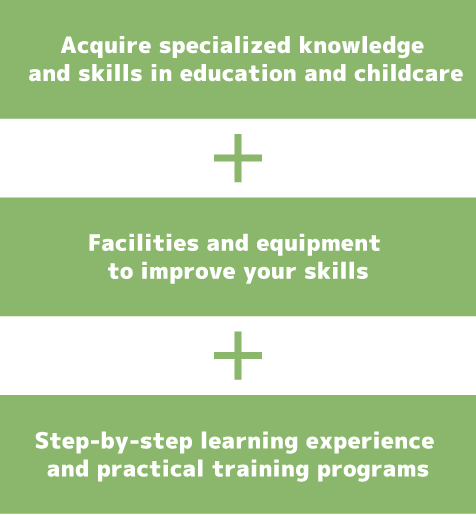
POINT1
Students can obtain both a nursery teacher qualification and a kindergarten teacher level 1 license upon graduation.
By acquiring both qualifications, students can broaden their career paths after graduation.
It is possible to work as a "nursery teacher" at "authorized childcare centers" that provide integrated education and childcare services, as well as at nursery schools, child welfare facilities and kindergartens.
POINT1
Students can obtain both a nursery teacher qualification and a kindergarten teacher level 1 license upon graduation.
By acquiring both qualifications, students can broaden their career paths after graduation.
It is possible to work as a "nursery teacher" at "authorized childcare centers" that provide integrated education and childcare services, as well as at nursery schools, child welfare facilities and kindergartens.
POINT1
Students can obtain both a nursery teacher qualification and a kindergarten teacher level 1 license upon graduation.
By acquiring both qualifications, students can broaden their career paths after graduation.
It is possible to work as a "nursery teacher" at "authorized childcare centers" that provide integrated education and childcare services, as well as at nursery schools, child welfare facilities and kindergartens.
Qualifications and Licenses
kindergarten teacher level 1 license/ nursery teacher qualification / social welfare director (application qualification) / child guidance counselor (application qualification) / child welfare officer (application qualification) ※.
※Qualification that can be obtained with conditions."
Future Career Paths
【Childcare and childhood-related】 nursery schools/kindergartens/authorized childcare centers/infant homes/child care institution 【Welfare-related】 social welfare directors/child welfare consultants (child welfare officers)/child guidance counselors/child independence support specialists/child life support workers/care workers at social welfare facilities 【Public employees】 local government employees (child care workers, kindergarten teachers)/government agencies involved in childcare and education in general/child welfare facilities 【Educational materials companies, children's book publishers, toy manufacturers, children's clothing manufacturers, and other general companies】planning, production, and sales, etc.
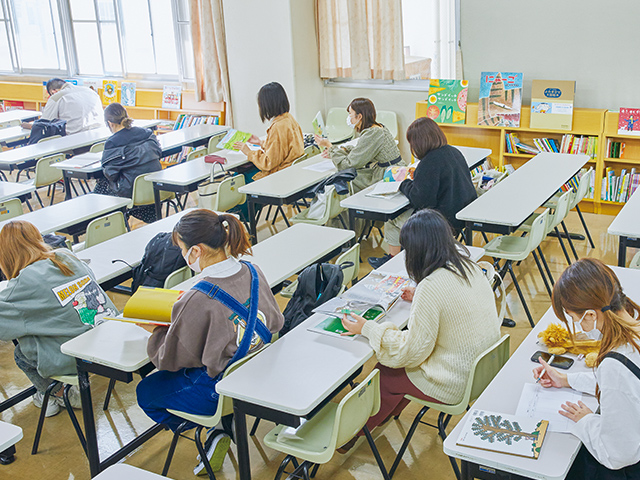

Students will also learn specialized subjects in relevant fields such as pedagogy, social welfare, and psychology in order to gain a deeper understanding of children.
Students can take advantage of the “internationalization and informatization” characteristic of Edogawa University and the strengths of the College of Media and Communication to study informatics, literature, and English, all while connecting these to childcare and early childhood education.
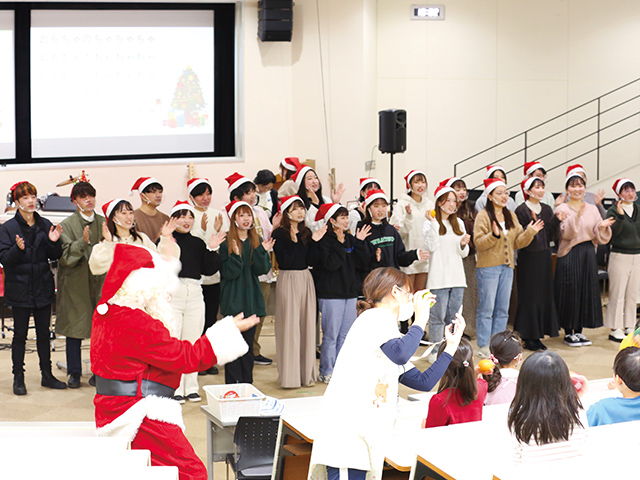

Rich expressive skills help us build deeper relationships with others while demonstrating who we truly are. Drawing out the potential children possess as practical abilities is also a crucial part of childcare work. Many classes in the Department of Childhood Communication Studies focus on dialogue and interaction between students and with the teacher through discussions, presentations, group work, and more. Students will cultivate expressive ability not only through writing and speaking, but through practical skills related to childcare (singing, performance, acting, crafting) through a variety of classes.
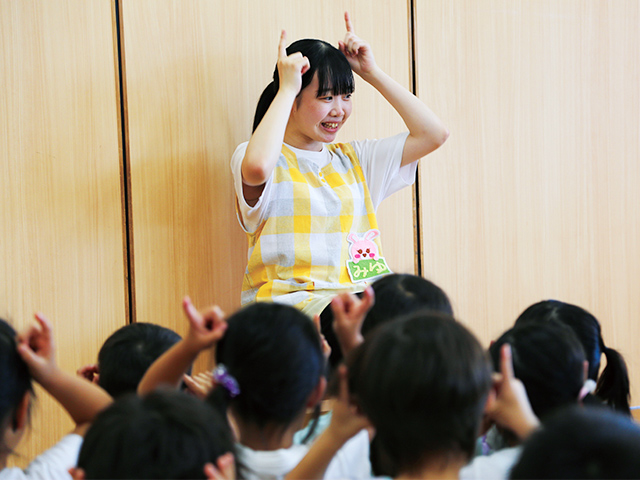

Students will have many opportunities to put classroom learning into practice at childcare institutions directly involved with children.
First and second year students will take tours or participate in workshops at nursery schools, childcare facilities, and kindergartens. Third and fourth year students will gain experience with children before the Childcare Internship (nursery school or childcare facility) and Teaching Internship (kindergarten or certified center for early childhood education and care).
When interning at actual facilities, students will receive guidance from childcare providers to steadily improve their practical skills. This understanding of different places of childcare gained through personal experience will help the student choose a career path after graduation.
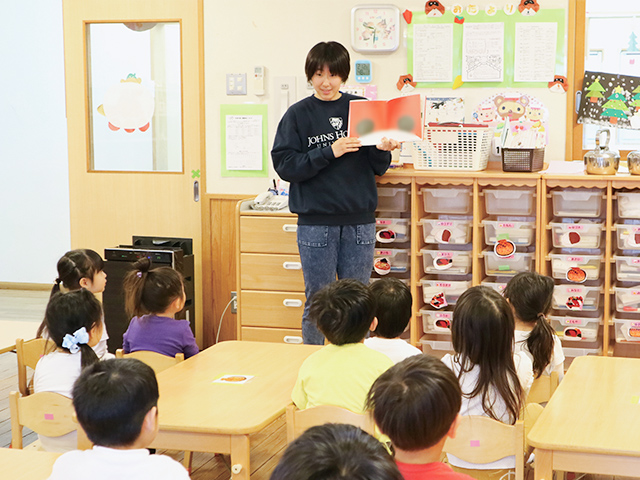

The ability to not only obtain qualifications but to spend time delving into your studies is a feature you’ll find only at a four-year university.
Discover a research topic of your own while studying various fields related to children. In the Special Seminar in the third year, students choose from seminars offered on a variety of topics according to their interests. Under the careful guidance of the professor, students will create a graduation thesis in their fourth year that compiles the results of their learning and research at the university.